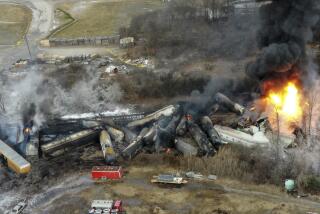Rail Accident Spurs Proposed Towboat Rules
- Share via
WASHINGTON — Amtrak’s worst railroad crash has prompted a call by Transportation Secretary Federico Pena for stricter bridge inspections, tougher licensing rules for towboat operators and better navigation equipment on the vessels.
The steps were among those announced Saturday by Pena in response to the Sept. 22 accident that killed 47 people when Amtrak’s Sunset Limited passenger train derailed crossing Bayou Canot bridge near Mobile, Ala.
Preliminary reports say a barge being towed struck the bridge just before the accident, knocking it out of line and setting in motion events that led to the deadliest wreck in Amtrak’s history. Investigators believe the failure of the towboat pilot to properly read his radar, lack of a compass on board and the absence of lights on the bridge contributed to the accident.
Pena, in a letter to Rep. John D. Dingell (D-Mich.), chairman of the House Energy and Commerce Committee, said he decided to act before the National Transportation Safety Board completes its study.
Among the recommendations:
* Beginning towboat operators would be restricted on size and configuration of barge tows and routes.
* For the first time, towboat operators would be required to pass simulator tests and written examinations each time they increased the scope of their licenses.
* Also for the first time, all operators would have to attend approved radar-training courses.
* Operators would have to gain experience and pass an examination on each route they want to operate in the Midwest and on some Gulf Coast waterways.
* All vessels would have to carry marine radar and marine charts. Now, only a radio is required.
* The definition of “marine casualty” would be expanded to include all collisions with bridges and other structures, and all casualties would have to be reported to the Coast Guard immediately. Currently, such situations must be reported “as soon as possible,” no later than five days. The current maximum $1,000 penalty for failing to report would be increased to $25,000.
More to Read
Sign up for Essential California
The most important California stories and recommendations in your inbox every morning.
You may occasionally receive promotional content from the Los Angeles Times.













